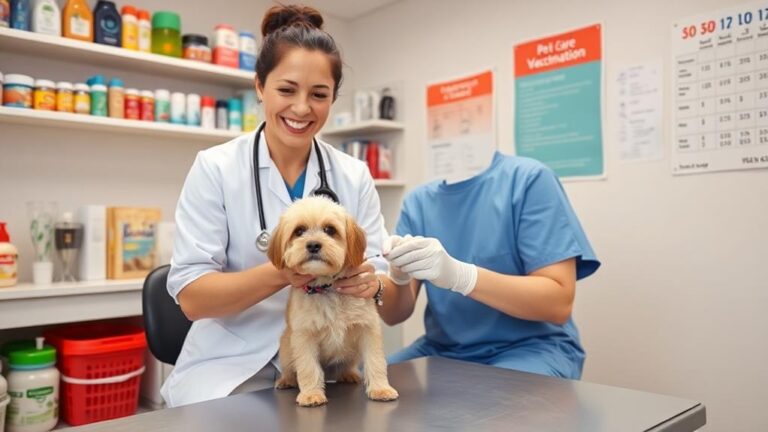If your puppy's peeing every 15 minutes, it might be a sign of health problems or just part of their growth. Puppies have limited bladder control until about 16 weeks old, so frequent trips outside are common. However, sudden changes in urination, like increased frequency, could mean issues like a urinary tract infection or diabetes. Anxiety or excitement can also make them urinate more often. It's smart to keep an eye on their behavior and speak to a vet if this continues—it's important to rule out any serious conditions. More insights can help you manage this situation better.
Causes of Frequent Urination
Frequent urination in puppies can be concerning, and it often signals underlying health issues.
If your puppy is peeing every 15 minutes, it might've a urinary tract infection or even kidney disease. Other possible conditions include diabetes, bladder disease, or liver problems.
Anxiety can also lead to increased urination, especially in young pups facing new environments. Remember, puppies usually lack full bladder control until around 16 weeks of age.
If your puppy's urination habits seem extreme, it's essential to consult a vet. They can help determine if there's a medical issue at play.
Early intervention can make a big difference in your puppy's health and comfort. Don't wait too long to seek help.
Normal Urination Patterns
Understanding normal urination patterns is key to recognizing when something might be wrong.
Puppies usually need to urinate every 1 to 2 hours. At around 8 weeks old, they've limited bladder control, so accidents are common. As they grow, adult dogs can hold their bladders longer, typically every 4 to 8 hours.
Smaller breeds may urinate more often than larger ones. It's important to take your puppy out regularly, especially during their early weeks.
Pay attention to their habits, and note any sudden changes. If your puppy starts peeing more frequently than usual, it could signal a health issue.
Keeping track of their urination will help you guarantee they're healthy and comfortable.
Age-Specific Urination Needs
As your puppy grows, their urination needs change considerably. You'll need to adjust how often you take them out. Here's a quick guide:
| Puppy Age | Urination Frequency |
|---|---|
| 10 weeks | Every 45 minutes |
| 3 months | Every 3 to 4 hours |
| 4 months | Every 2 hours |
At 10 weeks, your puppy's bladder control is limited. By 3 months, they can hold it for about 4 hours. Once they reach 4 months, increase the time between breaks to every 2 hours. This consistency helps with potty training and prevents accidents. Understanding these needs will help you manage your puppy's bathroom breaks effectively.
Signs of Urinary Tract Infections
A urinary tract infection (UTI) can cause your puppy to show some concerning signs. You might notice your puppy urinating small amounts very often. This could indicate discomfort or urgency.
Watch for blood in the urine, which is a serious sign. If your puppy is excessively licking their genital area, that might mean they're feeling pain.
Additionally, if your puppy seems to struggle while trying to pee, it's time to take action. These symptoms can sometimes be mistaken for other serious conditions, so don't delay in getting help.
A vet can evaluate your puppy and provide the necessary treatment if a UTI is present. Early intervention can make a big difference in your puppy's health and comfort.
Behavioral Factors Influencing Urination
When it comes to your puppy's bathroom habits, behavior plays a big role. Puppies often pee inside after being outside due to anxiety or excitement. This can happen if they feel overwhelmed or if they're not fully trained yet. Incomplete potty training can lead to accidents indoors.
Establishing a consistent potty schedule helps your puppy learn where it's appropriate to go. Puppies tend to prefer urinating in familiar, safe spots, so consider taking them to the same area each time.
Additionally, monitor their water intake. If they drink too much, they'll need to relieve themselves more often. By understanding these behavioral factors, you can help your puppy develop better bathroom habits and reduce accidents.
Conclusion
To sum up, if your puppy's peeing every 15 minutes, it's important to pay attention. It could be due to normal puppy behavior, but it might also signal health issues like infections or diabetes. Keep an eye on their habits and recognize when they need to go out. If you notice any unusual signs, don't hesitate to contact your vet. By understanding your puppy's needs, you can help them develop healthy habits and stay happy.



